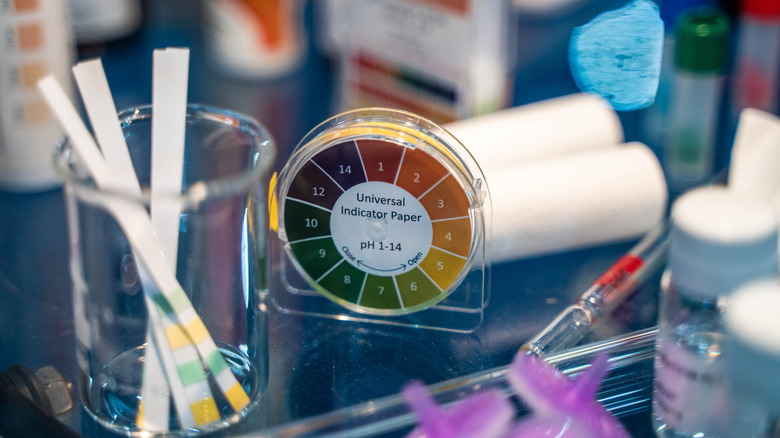Is The Alkaline Diet Right For You?
The drive for good health and longevity is shaping the eating habits of many people worldwide. From veganism to ketosis, new diet trends emerge constantly, making choosing the right one tricky. The alkaline diet has now joined the list, proposing a range of health benefits. Also known as the alkaline-ash diet or acid-alkaline diet (via News-Medical), the diet has grown in popularity, earning critical acclaim from many celebrities.
The name of the diet comes from the word "alkalinity," which refers to a substance with a pH higher than 7 (via MedicalNewsToday). The marketing pitch used by supporters of the alkaline diet is based on the principle that the diet will raise systemic pH values in the blood. Whether or not the diet is effective, its increasing popularity over the years can't be ignored. When considering this diet, it's crucial to understand how it works to ensure you're not following the hyped bandwagon in vain. Furthermore, speaking with your doctor or nutritionist should be the first step to prevent unwanted side effects.
What is pH?
According to the United States Geological Service (USGS), pH is a chemical term that measures how acidic a substance is, with a scale ranging from 0 to 14. On this scale, the number 7 — which is the middle ground — is also the neutral point. This indicates that any value below 7 is acidic.
Concerning the human body, acidic levels vary. While your blood is slightly alkaline — ranging between 7.35 and 7.45 pH values — the stomach maintains a pH value of 3.5 or below, indicating it's very acidic, according to WebMD. The body is naturally built to maintain a healthy pH balance between acidity and alkalinity, and this balance requires the lungs and kidneys to function at their best, per Healthline.
Besides maintaining its pH balance, the body also ensures that other organs or systems, such as the digestive tract, are in an ideal pH range and functioning efficiently. Your blood's pH level can become imbalanced if the lungs and kidneys malfunction, leading to two conditions known as acidosis and alkalosis, which may require dietary changes (via Healthline).
How does the alkaline diet work?
Supporters of the alkaline diet believe that modern diets acidify the body, and excessive acidity in our body causes various diseases (via News-Medical). The diet is premised on replacing acid-forming foods with alkaline foods. These can help us go back to the nutrients that used to be a mainstay in the past, as Healthline puts it. Most importantly, the promise of alkaline diets for healthy eating fuels its popularity.
There's no denying that a lot has changed regarding how we consume food in modern times. Compared to the past, we eat more processed foods, which are generally high in sodium, with significantly less potassium and magnesium. The Centers for Disease Control and Prevention (CDC) reiterates that most Americans eat too little potassium and too much sodium, far beyond the amount recommended in the 2020-2025 Dietary Guidelines. The alarming consumption of sodium is a mirror reflection of how industrialized our current food systems are compared to the early days of the agricultural revolution. Much of the sodium content in our diets today comes from restaurants and packaged foods, per the CDC. Interestingly, the connection between acid-forming foods and processed foods is clear. According to Healthline, processed foods increase the body's acidity levels.
Alkaline vs. acidic foods
The foods promoted by the alkaline diet are generally healthy choices, encouraging low-processed and fresh foods that are well known for high nutrition (via Cleveland Clinic). The list includes seeds, legumes, whole grains (like wild rice and oats), and non-starchy vegetables, like leafy greens, fruits, or unsweetened fruit juice. However, not all fruits and fruit juices meet the alkaline diet's guidelines. Typical examples like grapes, blueberries, limes, and lemon juice are acidic and might not be ideal for people with gastroesophageal reflux disease (via Healthline). These foods from these categories rank higher on the pH chain. On the other hand, acidic foods have a pH level of 4.6 and lower, per Healthline. They include processed foods, fresh and processed meats like corned beef, and sweetened beverages. Judging from the promoted foods, it's evident that alkaline diets promote healthy eating. However, whether or not the diet can treat certain illnesses is still up for debate.
Health conditions the alkaline diet claims to treat
Supporters of the alkaline diet often claim that the high intake of low pH foods might help prevent cancer. According to the American Institute for Cancer Research, a large part of this claim is based on the theory that cancer thrives in acidic environments — an alkalizing effect from high-pH diets may create an unfriendly environment for cancer. However, as per the American Institute for Cancer Research, this theory is problematic in several ways.
First, the body's acid-base balance and the blood's pH levels are tightly controlled and regulated by natural factors. Take the stomach, for example. Its acidic level is necessary for digestion, and no amount of alkaline foods can change the stomach's acidic nature. Generally speaking, the diet's effect on the pH value of your body is not significant enough to create a cancer-resistant environment, per the institute. MedicalNewsToday adds that significant blood pH changes might even pose health risks.
Nevertheless, following an alkaline diet might help lower sodium levels, ultimately reducing blood pressure (via WebMD). According to a 2012 study published in the Journal of Environmental and Public Health, increasing the intake of alkaline-based fruits and vegetables balances the potassium and sodium (K/Na) ratio. This balance can positively affect bone health and reduce muscle wasting. However, the evidence to fully support this claim is still limited, according to the study.
Should you follow the alkaline diet?
Irrespective of the lacking evidential relationship between the alkaline diet and certain health conditions, there are still some health benefits. An alkaline diet may not help your body or blood regulate pH levels, but the foods the diet promotes are generally considered healthy and might support healthy weight loss. On the diet, you'll reduce your sugar, alcohol, and processed food intake, which is a healthy choice (via WebMD).
A 2022 study published in the journal Frontiers in Nutrition reveals sugar as the key cause of obesity in sugar and sweetened beverages. The same applies to alcohol since heavy drinking can cause weight gain, per a 2015 study published in the journal Current Obesity Reports. This is when the alkaline diet might come in handy with its principles of eating fresh and highly nutritional foods. On this note, the alkaline diet could work and provide various health benefits, especially for weight loss.
However, it's crucial not to underestimate the importance of exercising as well. The American Heart Association recommends at least 150 minutes of physical activity per week. However, you may want to inform your doctor before starting any diet or exercise plan.






